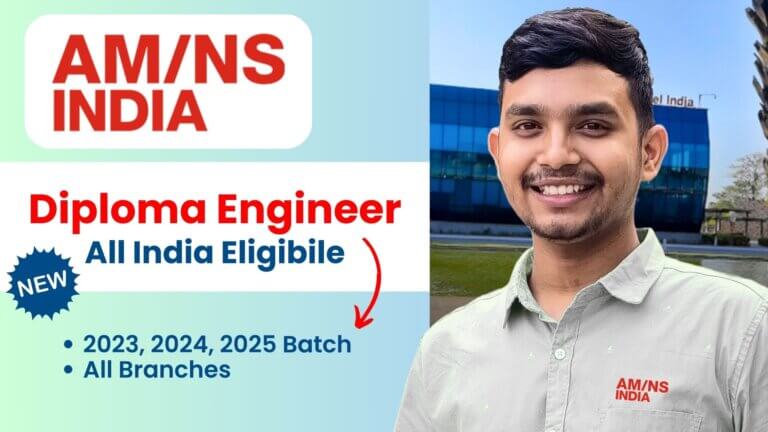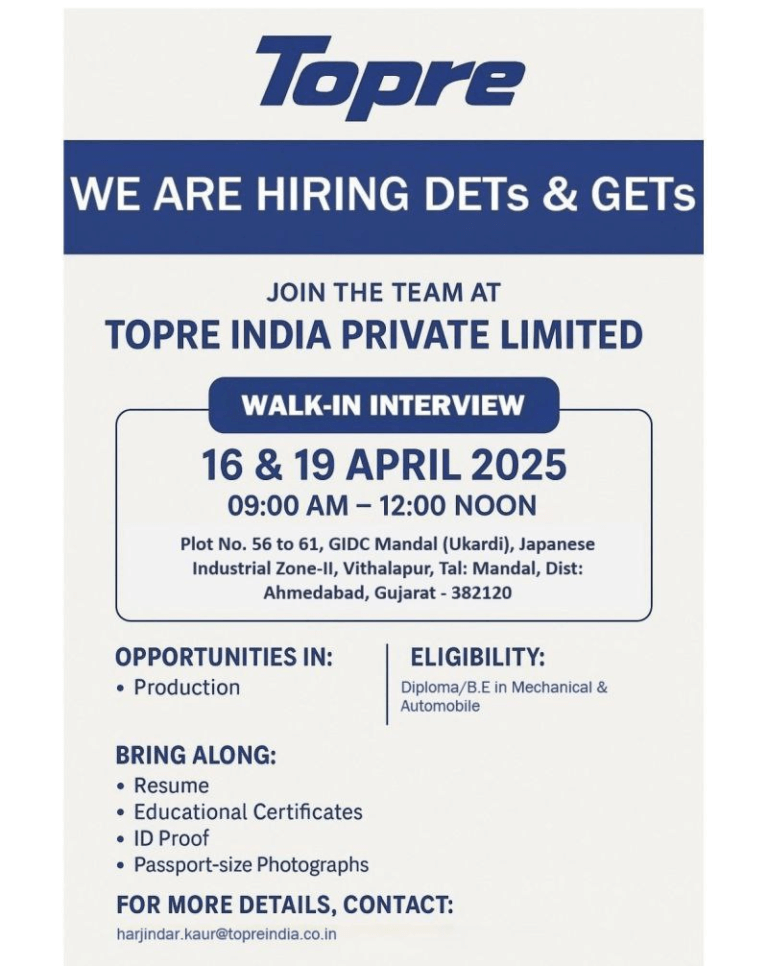If you are preparing for the SAIL Operator-cum-Technician Trainee (OCTT) exam, you might be wondering what is the syllabus and exam pattern for this post.
In this blog post, we will provide you with the latest and updated information on the SAIL OCTT syllabus and exam pattern, so that you can plan your preparation accordingly.
| Join Telegram Channel | Click Here |
| Join WhatsApp Channel | Click Here |
SAIL OCTT Previous Year Question Paper PDF
SAIL OCTT Exam Pattern
The SAIL OCTT exam consists of two stages: a written test and a skill test. The written test is divided into two parts: Part A and Part B.
Part A is common for all disciplines and consists of 50 questions on General Aptitude, Reasoning, General Awareness, and English.
Part B is specific to the discipline applied for and consists of 50 questions on the relevant technical subject. The total duration of the written test is 90 minutes and the total marks are 100. There is a negative marking of 0.25 marks for each wrong answer.
The skill test is qualifying in nature and is conducted only for those candidates who qualify in the written test. The skill test is based on the practical knowledge and skills of the candidates in their respective disciplines.
SAIL OCTT Syllabus
The syllabus of the Written Test (CBT) is shared below:
| S.No. | Subject | No.of Question | Mark |
| 1 | General Knowledge/Reasoning/Aptitude | 50 | 50 |
| 5 | Relevant Diploma Engineering Stream | 50 | 50 |
| Total | 100 | 100 |
SAIL OCTT Syllabus Part A
The syllabus for Part A of the written test is as follows. It is common for all disciplines.
General Knowledge/ General Awareness :
1. Scientific Research
2. Budget and Five-Year Plans
3. Sports-Athlete such as essential knowledge
4. Economy
5. Science – Inventions & Discoveries
6. Economy, Banking, and Finance
7. General Politics
8. India and its neighbouring countries
9. Scientific progress development
10. Capital
11. Knowledge of Current Events
12. Important Financial & Economic News
13. Culture
14. India and its neighbouring countries
15. Scientific progress development
16. Capital
17. Knowledge of Current Events
18. Geography
19. Indian Constitution
20. Science – Inventions & Discoveries
21. Economy, Banking, and Finance
22. General Politics
23. Geography
24. Indian Constitution
25. History
26. Countries & Capitals
27. Important Financial & Economic News
28. Culture
29. General knowledge
30. Current Affairs – National & International
31. Books
32. Indian Languages
33. National & International Awards
34. Currency
Verbal Ability/Reasoning :
1. Analogy
2. Embedded Figures
3. Arithmetical Reasoning
4. Cubes and Dice
5. Statements & Arguments
6. Number Series
7. Data Interpretation
8. Decision Making
9. Mirror Images
10. Blood Relations
11. Directions
12. Clocks & Calendars
13. Coding-Decoding
14. Syllogism
15. Alphabet Series
16. Number Ranking
17. Non-Verbal Series
18. Statements & Conclusions.
Quantitative Aptitude Syllabus :
1. Number System
2. LCM & HDF
3. Decimal & Fraction
4. Simple & Compound Interest
5. Time and Work
6. Time and Distance
7. Ratio and Proportion
8. Data Interpretation
9. Average
10. Algebra
11. Probability
12. Mixture and Allegation
13. Profit and Loss
14. Time, Speed and Distance
15. Statistics
16. Percentage
17. Trigonometry
18. Geometry
SAIL OCTT Syllabus Part B
The syllabus for Part B of the written test is specific to the discipline applied for and covers topics related to the technical subject.
The candidates can refer to the official notification or website of SAIL for the detailed syllabus of Part B.
Mechanical Engineering
- Probability & Statistics
- Operations
- Operations Research
- Vector Calculus
- Fluid Mechanics
- Refrigeration and air-conditioning
- Engineering Materials
- Turbomachinery
- Theory of Machines
- Metal Casting
- Calculus
- The design of Machine Elements
- Thermodynamics
- Differential Equations
- Tool Engineering
- The Strength of Materials
- Joining Processes
- Forming Processes
- Numerical Methods
- Engineering Mechanics
Electrical Engineering
- Electrical Engineering Materials
- Machines
- Instruments
- Electrical Measurements & Measuring
- Microprocessor
- Analog Circuits/ Electronics
- Digital Electronics
- Power Electronics & Drives
- Circuit Theory
- Control System
- Power Systems
- Electrical Basics
- Network theory
Metallurgy
- Mechanical Metallurgy
- Physical Metallurgy
- Extractive Metallurgy
- Manufacturing Processes
- Thermodynamics and Rate Processes
Civil Engineering
- Transportation Engineering
- Concrete/ Construction Technology
- Fluid Mechanics
- Engineering Mechanics
- Structural Engineering/Steel/ Reinforced Cement Concrete
- Civil Engineering Materials
- Environmental Engineering
- The Strength of Materials
- Structural Engineering/RCC design
- Soil Mechanics
- Survey estimating
Chemical Engineering
- Instrumentation and Process Control
- Process Calculations and Thermodynamics
- Fluid Mechanics and Mechanical Operations
- Chemical Technology
- Chemical Reaction Engineering.
- Plant Design and Economics
- Mass Transfer
- Heat Transfer
Electronics and Communication
- VLSI and Embedded Systems
- Signals and Systems
- Electromagnetic Fields and antennas
- Computer Engineering
- Analogue electronic circuits
- Communication Systems
- Control Systems and instrumentation
- Electronic Communication
- Digital Signal and Image Processing
- Semiconductor Theory and Electronic Devices
- Circuit Theory
We hope that this blog post has given you a clear idea of the SAIL OCTT syllabus and exam pattern. You can use this information to plan your preparation strategy and revise the important topics.
You can also practice mock tests and previous year’s papers to improve your speed and accuracy. We wish you all the best for your SAIL OCTT exam.


